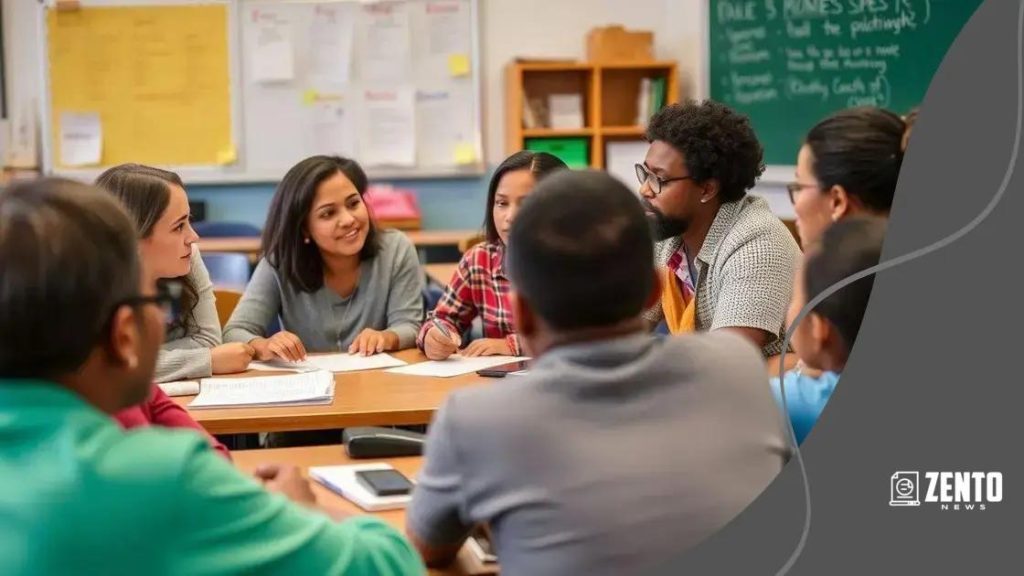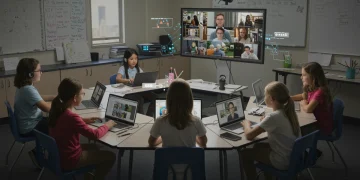Parents join school policy: Why your voice matters

Anúncios
Parents join school policy to actively influence educational decisions, improve student outcomes, and foster collaboration between families and educators by engaging in meetings, advocating for changes, and maintaining effective communication.
Parents join school policy discussions to ensure their children’s voices are heard. Have you ever wondered how your input can shape educational decisions that affect your community? Let’s explore the profound impact of parental involvement.
Anúncios
Understanding the role of parents in school policy
Understanding the role of parents in school policy is essential for fostering a collaborative educational environment. Parents are not just observers; they are key players in shaping the policies that affect their children’s education. When parents actively engage in discussions and decisions, they help create a well-rounded educational experience that benefits everyone.
The importance of parental engagement
The involvement of parents in school policy creates a richer dialogue between educators and families. When parents voice their opinions and share their experiences, they provide valuable insights that can lead to better outcomes for students.
- Improved communication between parents and educators.
- Greater awareness of school programs and needs.
- Boosted student morale when families engage.
- A more inclusive environment that reflects community values.
Moreover, parental involvement encourages transparency. Schools show they value feedback, fostering trust within the community. Parents can address issues, share concerns, and suggest improvements based on their children’s experiences. This cooperative approach leads to informed decisions that consider the needs of all students.
Anúncios
How parents can get involved
Getting involved in school policy can feel challenging, but it’s more accessible than it seems. Here are a few steps parents can take to become active participants:
- Attend school board meetings to stay informed.
- Join parent-teacher organizations to share ideas.
- Volunteer for committees that focus on policy changes.
By taking these steps, parents not only make their voices heard but also contribute to a stronger educational system. Their perspectives are crucial for driving positive changes that enhance the learning environment.
Parental engagement in school policy can lead to effective practices that support student success. When parents collaborate with schools, they help foster an educational landscape that is responsive to the needs of all students. The roles parents play shouldn’t be underestimated; they are vital to the formulation of policies that genuinely reflect the desires of the community.
Benefits of parental involvement
Benefits of parental involvement in school policy are substantial. When parents take an active role, it can lead to better educational outcomes for students. Their engagement fosters a sense of community and greatly enhances the overall learning environment.
Enhancing student achievement
Research shows that children whose parents are involved in their education tend to perform better academically. Parental support can motivate students and help them develop a positive attitude toward school.
- Increased motivation for students to succeed.
- Higher grades and test scores.
- More frequent homework completion.
- Greater overall engagement in school activities.
Involvement can take many forms, from attending parent-teacher conferences to volunteering in classrooms. Each act of participation demonstrates to students that education is valued. This is crucial during their formative years.
Building stronger relationships
Another major benefit is the strengthening of relationships between parents and teachers. When parents are involved, they foster trust and communication. This partnership allows for a better understanding of student needs and strengths.
- Better communication channels between home and school.
- Collaboration on student-focused solutions.
- Mutual respect that benefits everyone involved.
The combination of parents and educators working together creates a more effective educational system. It also instills in students a sense of belonging, contributing to their emotional well-being.
Furthermore, schools that encourage parental involvement often see higher levels of community support. This community engagement plays a vital role in resource allocation and program development, ultimately benefiting all stakeholders in the education system.
How parents can influence policy changes

How parents can influence policy changes is a vital topic in today’s educational landscape. Parents have unique perspectives that can shape school policies significantly. By understanding their power and taking action, they can help create positive changes in their children’s educational environments.
Strategies for active involvement
Parents can get involved in various ways that directly impact policy decisions. Being proactive is key to making their voices heard. Here are some effective strategies:
- Participate in school board meetings to share concerns and suggestions.
- Stay informed about current policies and proposed changes.
- Collaborate with other parents to form a united front.
Engaging in school activities like committees or advisory boards allows parents to voice opinions and contribute to discussions that shape school governance.
The power of advocacy
Advocacy is another powerful tool for parents. By organizing campaigns, they can raise awareness about important issues. This includes speaking to local media or using social media platforms to gather support for their cause.
- Raise awareness about specific issues affecting students.
- Create petitions to show community support.
- Communicate regularly with school officials to discuss necessary changes.
By showcasing the collective concern of parents, decision-makers are more likely to take action.
Parents should also leverage their connections within the community. By building relationships with local leaders and stakeholders, they can effectively advocate for changes. These connections can lead to discussions that help shape educational policies in favor of students.
Ultimately, the more involved parents are in policy discussions, the more they can create an impact. Their contributions are crucial to ensuring that policies reflect the needs and aspirations of the community.
Real-life examples of parent engagement
Real-life examples of parent engagement showcase the powerful impact that families can have on school communities. These stories demonstrate how parent involvement can lead to positive changes for students and schools alike.
Case Study: The Parent-Teacher Organization (PTO)
One successful example is the formation of a Parent-Teacher Organization in a local school. This group brought together parents and teachers to discuss challenges and brainstorm solutions. By organizing events and fundraisers, they were able to enhance school resources significantly.
- Increased funding for school supplies and technology.
- Improved communication between parents and teachers.
- Stronger community ties through school events.
This collaboration not only benefitted the school but also fostered a sense of belonging for the families involved.
Community Advocacy: Changing Lunch Programs
Another inspiring story comes from a group of passionate parents advocating for better lunch options in their children’s school. They formed a coalition and petitioned the school board to improve the quality of school meals. Their efforts included:
- Meeting with nutritionists to develop healthier meal plans.
- Organizing taste testing events for students.
- Mobilizing support from other parents through social media.
Their persistent advocacy led to a complete overhaul of the lunch program, ensuring that students had access to nutritious food that would help them perform better in class.
Additionally, a local high school saw remarkable improvements after parents initiated regular town hall meetings. These gatherings allowed parents, teachers, and students to engage in open discussions about school policies and student needs. This initiative resulted in:
- Creation of mentorship programs connecting older students with younger ones.
- Increased student participation in extracurricular activities.
- Better understanding of academic pressures faced by students.
Such examples highlight the diverse ways parents can engage with schools. When parents take action, it creates ripple effects that benefit students, teachers, and the entire community.
Strategies for effective communication with schools
Strategies for effective communication with schools plays a crucial role in fostering a productive relationship between parents and educators. Good communication helps address concerns, share valuable insights, and ensures that everyone is working towards the same educational goals for the children.
Establishing open lines of communication
One of the best strategies is to establish open lines of communication early on. Parents should feel comfortable reaching out to teachers and school staff. Regular check-ins can help maintain this connection. Here are some useful methods:
- Use email for quick updates or questions.
- Schedule regular meetings with teachers to discuss student progress.
- Follow the school’s communication policy for updates on events and changes.
By proactively communicating, parents show they are invested in their children’s education, leading to stronger relationships with school staff.
Attending school events and meetings
Parents should also participate in school events, such as open houses, parent-teacher conferences, and workshops. These gatherings provide opportunities to meet teachers and staff in person, making communication more personal and effective.
- Engage in school activities to show support.
- Network with other parents to share experiences.
- Ask questions during these events to gain insights.
Being present at these events not only enhances communication but also demonstrates commitment to the school community.
Another effective strategy is to utilize technology. Many schools offer online portals where parents can access information about assignments, grades, and announcements. Staying updated through these platforms ensures that parents can address any potential issues promptly. By being aware of what is happening in the school, parents can better support their children’s learning.
Ultimately, the key to successful communication lies in mutual respect and understanding. Parents should approach conversations with an open mind and a collaborative spirit. Listening to educators’ insights while sharing their own perspectives creates a cohesive dialogue that benefits everyone involved.
In conclusion, the role of parents in school policy is vital for creating a positive educational environment. Through active engagement, such as participating in meetings, advocating for change, and communicating effectively with educators, parents can significantly influence schools. When families unite to support educational initiatives, they help ensure that students receive the best possible learning experiences. By working together, parents and schools can foster a thriving and inclusive community that prioritizes the needs of all students.
FAQ – Common Questions About Parent Engagement in School Policy
Why is parental involvement important in school policy?
Parental involvement is vital because it helps ensure that the needs and concerns of students are addressed, leading to better educational outcomes.
How can I get involved in my child’s school policies?
You can get involved by attending school meetings, joining parent-teacher organizations, and voicing your opinions during discussions with educators.
What are effective communication strategies with school staff?
Effective communication can involve regular emails, attending events, and using online platforms provided by the school to stay informed and connected.
Can you give examples of successful parent engagement?
Successful examples include forming parent-teacher organizations, advocating for better school lunch programs, and hosting community meetings to discuss educational policies.





